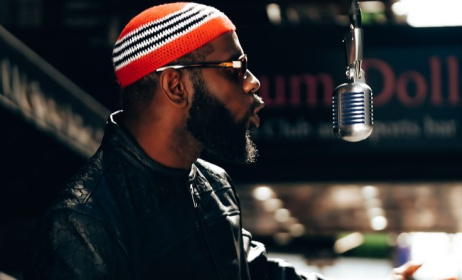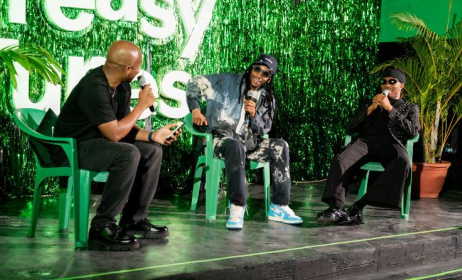Falz: More artists need to evoke Fela’s spirit
Falz’s music would be arguably poorer and less edgy had the Nigerian rapper not modelled his artistic demeanour on the incorrigible iconoclast Fela Kuti. This is tantamount, at least sonically, to narrating Chris Brown’s impact and rise to popularity without citing the archetypal inspiration that Michael Jackson had on the ‘Run It’ hitmaker.
 Falz.
Falz.
Falz has moulded himself into a darling of criticism. Like Fela, the lawyer-turned-musician is a socio-political commentator whose art talks about the social ills he grew up around. He was just a child when Fela died, but today the 30-year-old ’This Is Nigeria’ man is constantly reminding Nigerians about the continual relevancy of Fela’s messages, telling listeners that it will take more work and courage to put an end to the vicious cycle of corruption and poverty in his country. With a music career spanning more than a decade, Falz also draws inspiration from his father, Femi Falana, a human rights activist and lawyer who represented Fela.
Music In Africa spoke to Falz who was recently in Johannesburg to shoot a music video for the amapiano remix of ‘Squander’ featuring South African artists Kamo Mpela and Mpura.
MUSIC IN AFRICA: Why are you in Johannesburg?
I am here to enjoy the city and do a bit of networking. I am also shooting a video for my brand new remix song called ‘Squander’.
Which artist do you look up to and who did you grow up listening to?
[Laughs] I would say the legendary Fela Kuti – he was an icon. I admire the way he lived his life and the sort of music he made. The kind of impact that he had on lives is what became particular to me. Impact is important to me as an artist and that’s why he is my idol ... My dad was Fela’s lawyer for a long time. I remember how my siblings and I would get into my dad’s car and play Fela’s music. I can almost sing all Fela’s music word for word and that had a lot of influence in my career.
You have collaborated with artists like Simi, Ms Banks and Patoranking. Why are collaborations important in the career of an artist?
Collaborations are crucial. As artists, we have different sounds individually and when we come together these sounds become magical. It’s rare to be able to create that fusion alone and it can only be achieved if artists come together. This is the reason why I appreciate the importance of collaborations in my career. I will always continue to do collaborations and I would love to work with more South African artists.
What was your latest collaboration like?
It was beautiful because we managed to make wonderful sounds. The synergy of all the different sounds coming together was massive. Where I come from, we make music that is typically called Afrobeats and here in South Africa there is amapiano, and being able to collaborate with artists in this country made me realise that there is nothing more interesting than getting the sound directly from the source. Amapiano is a South African product and us being able to come here and do that remix is something I wouldn’t have been able to achieve on my own.
What aspects of the South African music industry do you admire that could be useful in Nigeria?
I think there is a nice structure of the industry here and another aspect is that South African society is well-knit in such a way that it allows people to connect without any challenges. I have been able to meet new people through someone I know. This is very useful because at the end of the day there is enough space for everyone to fly. These unnecessary rivals and bad blood, in my opinion, are not important. Unity is a crucial aspect in society and it’s something that I think we should tap into.
It’s been more than a decade since you joined the music industry. How has your music changed rap scene in Nigeria and Africa?
Wow! This is an interesting one. I think my music has positively impacted the rap scene in Africa because I managed to introduce a new style of rap, which is fused with our traditional sounds. I have been able to serve it in such a way that it became commercially viable. Prior to that, the only kind of rap that people knew was the regular hardcore kind, but I have been able to serve it in a different format that is swallowable.
Are you doing enough to remind Nigerians about Fela Kuti?
What an interesting question... I think there can never be enough of reminding because of the kind of space that we exist in. The space that we exist in is chaotic. When you see how Nigerians are and their character, you wouldn’t really get a clear picture of what’s happening back home. It’s also the way that we were built to be, because there has been so much crap that we’ve had to deal with. So people had to develop a tough skin and tried to find humour in every little thing to remain happy. But because of the way that everything is upside down, there can never be enough. More artists need to talk about it, more artists need to evoke Fela’s spirit. I am doing my best and as much as I can. Music has different functions to enlighten, awaken and entertain. So I always want to maintain a balance at all times.
What would you tell Fela Kuti if he were alive today?
First of all, I would tell him that I would want to work with him. I would also tell him that everything he spoke about is still ongoing. That is the most depressing thing to think about, because he was making music in the 1960s and 1970s and a lot of things that he complained about are still happening. That is what I would say to him.
There was pressure from Islamic groups following the release of ’This is Nigeria’ in 2018. What impact did the song have on you?
All that was mostly noise. Everyone knows the symbolism of those things and what is in that video, especially if you are Nigerian. All those people just wanted to make noise, but I think that record had a big impact and I didn’t expect it. For me it was just taking the beautiful work that was created by Childish Gambino and reinterpreting it in my own way based on my own environment and experiences. It caught fire and I never expected it, and today I think it’s one of my most viewed videos on YouTube.
Are there barriers that prevent artists from exercising their creativity in Nigeria?
Not necessarily. I think as a people we are very creative and we have been able to find a way within a way. Even though there seems to be a way that music is made, even within that you find out that people still create sub-genres and different ways to make music. I don’t think there is anything that is hindering creativity that much.
Prostitution forms part of the lyrical content in your 2019 album Moral Instruction. Following the album’s release, there was criticism on social media with your fans and critics questioning why you didn’t talk about men who patronise prostitutes. Some publications even labelled you a misogynist. What are your thoughts about this today?
Yes, I understand that and I get where you’re coming from, because women have always been marginalised and oppressed. Women have, for a long time, not been able to find a way to voice their concerns, and now this is the age when the real movement of feminism is starting with more women beginning to find their voices. It appeared that this artist that we very much admired was constantly telling us how to live our lives, and I think I learnt a thing or two from that and for that reason it’s something that I sort of stayed away from talking about since then. I think it’s more important to enforce the importance of being able to do what you want with your body, whether it’s working as a sex worker or whatever you want to do without a man telling you what to do. That is why they asked why I wasn’t talking about men patronising women. It’s something that I understand completely and have stayed away from talking about.
Any upcoming projects this year?
I am working on an album. Hopefully it will be out in the next month or two. I haven’t decided on the title yet




























Comments
Log in or register to post comments